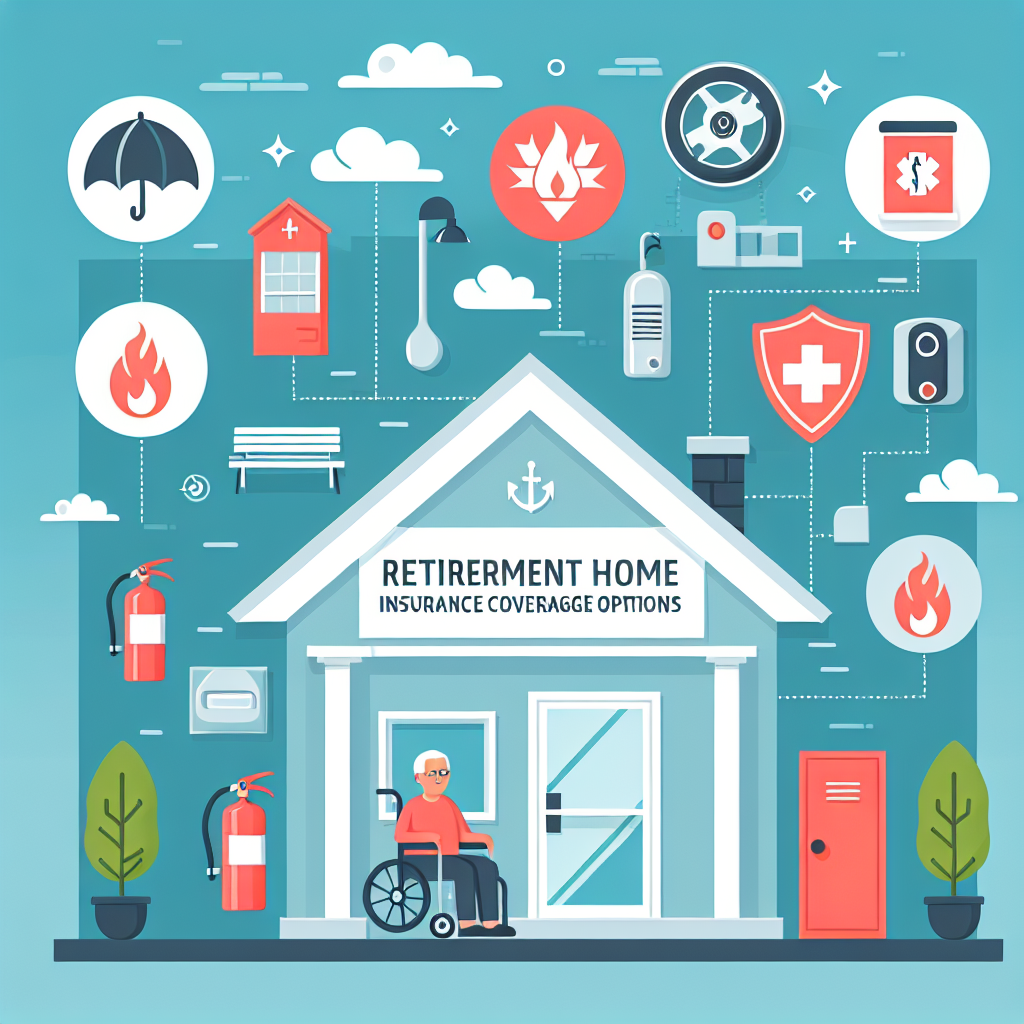Filed under Home Insurance on
Understanding Retirement Home Insurance Coverage Options

When it comes to planning your golden years, ensuring your living arrangements are safe and secure becomes a top priority. Retirement home insurance plays a crucial role in protecting your new lifestyle. Planning for retirement involves more than just financial preparation—it includes understanding the various insurance options available for those transitioning into retirement homes. This comprehensive guide aims to demystify retirement home insurance coverage, providing valuable insights to help you make informed decisions. Whether you're exploring options for yourself or a loved one, this article will provide clarity on this essential yet often overlooked component of retirement planning.
Why Retirement Home Insurance Is Essential
As you or your loved one transition into a retirement community, the need for specific insurance coverage becomes apparent. Unlike standard homeowners' insurance, retirement home insurance is tailored to meet the unique needs of those residing in assisted living or independent living facilities. This specialized insurance is designed to protect not only your personal belongings but also cover liability in case of an unforeseen event. Investing in retirement home insurance ensures peace of mind, knowing you are financially protected in your new home setting. Given that retirement homes come with their own nuanced set of rules and risks, having appropriate coverage becomes indispensable.
Types of Retirement Home Insurance Coverage
Understanding the different types of coverage provided under retirement home insurance can significantly affect your decision-making process. Each type serves a unique function, addressing specific needs and scenarios an individual might encounter in a retirement home environment.
Personal Property Coverage
This aspect of retirement home insurance addresses the protection of personal items such as clothing, furniture, and electronics. Given the shift from a family home to a more compact living space, identifying which belongings are essential and ensuring they’re insured is crucial. The primary keyword, retirement home insurance, plays a significant role in determining the scope and limit of the coverage applicable to these valuables.
Liability Coverage
Liability coverage is another important facet of retirement home insurance. This provision safeguards you against potential lawsuits stemming from accidental injuries occurring within your apartment. As residents interact frequently, there’s always a risk of inadvertently causing harm or damaging property. Liability coverage ensures that any legal fees or medical expenses resulting from these incidents are handled without draining your retirement funds.
Loss of Use Coverage
This type of coverage comes into play if your living quarters become uninhabitable due to damage or necessary repairs. "Loss of use" provides temporary housing solutions, ensuring a seamless continuation of living arrangements even in unforeseen circumstances. Choosing the right retirement home insurance policy with adequate loss of use coverage can prevent displacement and provide comfort during stressful times.
Additional Living Costs
In some cases, extended stay requirements or temporary relocations might incur costs beyond standard living expenses. Retirement home insurance policies with provisions for additional living expenses ensure that costs such as temporary lodging, meals, and transportation are covered, maintaining your lifestyle without financial strain.
Factors Affecting Retirement Home Insurance Premiums
Understanding the variables that influence retirement home insurance premiums empowers you to manage your expenses wisely. By recognizing how factors such as location, coverage level, and resident health impact your premiums, you can tailor your policy to suit your needs and budget.
Location
The geographical area where the retirement home is located significantly affects insurance rates. Homes in areas prone to natural disasters or higher crime rates typically incur higher premiums. It's important to evaluate the safety and risk profile of your preferred location to budget accurately for retirement home insurance.
Coverage Levels
Premiums are directly linked to the extent of coverage you choose. Comprehensive policies that cover a wide array of scenarios naturally cost more than basic plans. When selecting retirement home insurance, balance your need for extensive coverage with your budget constraints to determine the optimal policy.
Health of the Resident
The health status of the individual entering a retirement home also plays a role in determining insurance costs. Insurers consider medical conditions and the potential need for medical care or liability claims when setting premiums. A thorough health assessment can provide a clearer understanding of your coverage needs and financial commitments.
How to Choose the Right Retirement Home Insurance Policy
Selecting the ideal retirement home insurance policy involves a strategic approach that accounts for personal needs, risks, and financial considerations. With numerous options available, identifying key elements can guide your decision.
Assess Your Belongings
Begin by making an inventory of personal possessions you intend to bring to the retirement home. This list will help in determining the amount of coverage needed for personal property, ensuring that your cherished items are adequately protected under your retirement home insurance policy.
Evaluate Coverage Needs
Consider potential risks and scenarios that might require coverage, such as liability or additional living costs. Tailor your policy to accommodate these needs while remaining within budget, ensuring comprehensive protection without unnecessary expenditure.
Compare Multiple Providers
Researching different retirement home insurance providers allows for a comparison of policies, premiums, and customer service quality. Reviews and ratings from existing clients provide insight into the reliability and responsiveness of insurers, aiding in making an informed choice.
Consult an Insurance Expert
Engaging with a professional specializing in retirement home insurance can provide personalized advice and clarify complex policy details. Experts can help you understand the fine print and identify any potential pitfalls, optimizing your insurance selection process.
Trends in Retirement Home Insurance
The insurance industry continually evolves, and staying informed about the latest trends influencing retirement home insurance can offer advantages. By understanding these shifts, you can align your insurance strategy with current market conditions.
Emphasis on Customization
Modern retirement home insurers increasingly emphasize personalized coverage options. More policies are offering modular structures, allowing residents to customize their insurance according to specific needs and preferences. This trend towards customization ensures that residents pay for only those coverages they deem necessary, promoting cost-efficiency.
Integration with Health Services
Some insurers are collaborating with healthcare providers to bundle health services with retirement home insurance. This integration aims to offer a holistic approach to retirement living, where insurance not only covers property and liability but also supports health and wellness services, making policies more attractive and comprehensive.
Digital Innovations
The rise of digital technology is transforming how retirement home insurance is managed. From streamlined online applications to easy policy management and quick claims processing, digital solutions enhance user experience and offer more efficient interactions with insurance providers. Understanding and embracing these technological advancements can simplify your insurance journey.
Expert Opinions on Retirement Home Insurance
Industry experts emphasize the importance of proactive planning when it comes to securing retirement home insurance. Joan Cook, a renowned retirement advisor, states, "Choosing the right retirement home insurance ensures that your lifestyle remains uninterrupted, providing a financial safety net that protects your peace of mind." Similarly, insurance expert David Allen highlights the need for diligence, advising retirees to "review and update policies regularly, considering changes in health and living circumstances, to maintain optimal coverage over time."
Conclusion
In essence, retirement home insurance is an integral component of planning for a secure and fulfilling retirement. By understanding the different coverage options, assessing your specific needs, and keeping abreast of industry trends, you can navigate the landscape of retirement home insurance with confidence. Investing time and resources into selecting the right policy will ensure that your retirement years are not only enjoyable but also protected against unforeseen challenges. As you prepare for this new chapter, let the insights provided in this guide serve as a trusted resource, aiding you in making informed decisions that reflect your unique lifestyle and aspirations.





